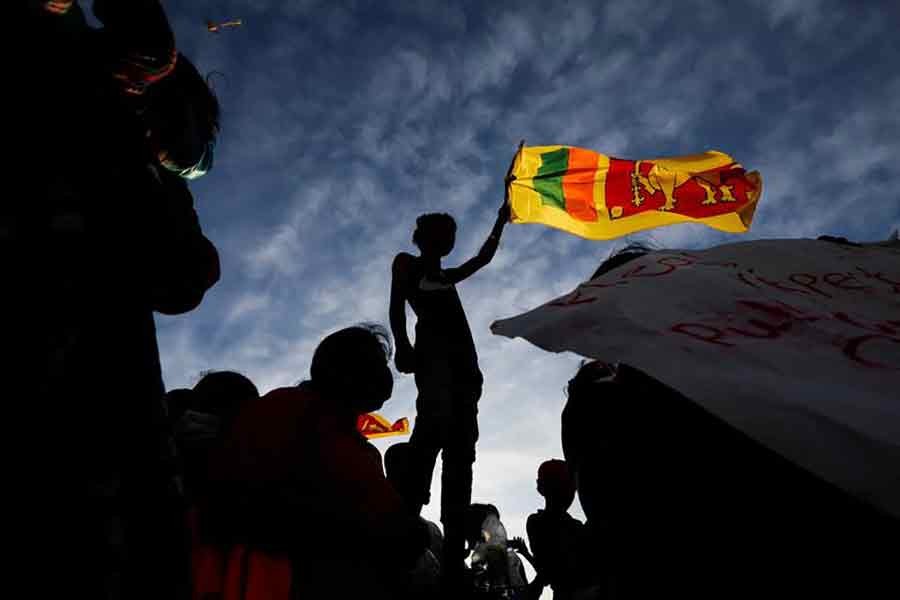
Published :
Updated :

Economic experiences of some of the South-East Asian countries like South Korea, Singapore, Taiwan had long been taught in courses on economic development. In fact, developing countries like Bangladesh were advised to follow the paths of the so-called emerging tigers. However, the only South Asian country that could draw attention because of high human development and less unequal distribution of economic growth is the island-nation Sri Lanka. Amartya Sen's attempt to glorify the success stories of Sri Lanka in his various writings is no secret either.
But Sri Lanka has now become a self-declared bankrupt country on the heels of its failure to repay debts. She is unable to pay debts in the face of declining foreign exchange reserves and sharp fall in export receipts and domestic revenues. These developments such as soaring inflation, unemployment, shortage of fuel and electricity have triggered political protests further, worsening the situation. The reasons for such a sorry state of affairs of the Sri Lankan economy can be traced back to several factors.
First, the present government of Sri Lanka went for a dramatic reduction in both personal and corporate taxes resulting in lower revenue earnings and bigger budget deficit. Whereas the government should have raised interest rate and cut expenditure on all fronts, the reverse reigned supreme. Thus the central bank printed notes despite advice against it from international organizations. So too much money chased too few goods. The lesson is that (a) a reduction in tax rates across the board could be counterproductive unless matched by reduction in expenditures and (b) the printing of notes is the last best solution.
Second, the president of the country declared in April 2021 that use of chemical fertilisers would be banned to pave the way for organic farming. When environment was placed ahead of economics - not gradually but with a 'revolutionary zeal' - the ban reduced the production of major export items such as tea and rice by one-fifth and thus forced upon a shift from self-sufficiency to import dependence within six months. Thus, decline in earnings and increase in imports added fuel to the fire.
Third, Sri Lanka undertook few mega projects allegedly, white elephants, not able to generate enough resources to repay the loan made for the projects. Mostly from China, the very expensive supplier's credit emerged as a bane rather than a boon. Fourth, the tourism sector on which the Sri Lankan economy survives most, faced a serious downturn following corona crisis. Now in the aftermath of all these including the war between Russia and Ukraine, the island nation has been deprived of a lot of foreign exchange and domestic economic activity tagged with tourism. Finally, the 'crony capitalism' developed by the ruling oligarchs to maximise their political gain at the expense of natural economic laws, proved to be the last nail in the coffin. After all, as you sow, so you reap.
Fortunately, Bangladesh's present situation is far better than Sri Lanka's and she is unlikely to fall into that debt trap in the foreseeable future. But the benefit of a crisis is that it points to the drawbacks of the existing polices and brings to the fore the problems to be overcome whether by the country itself or by its neighbours. Hence, instead of being complacent, the country should immediately pay attention to the weaknesses that could invite any crisis. The leadership has to be cautious and learn from the experiences of the island nation. Bangladesh's strengths lies in its relatively stable macro-economic indicators and the reality that the foreign debts of Bangladesh account for only about one-fifths of the country's gross domestic product which is labelled as low by international comparison.
Most of the external debts are with bilateral or multilateral institutions such as the World Bank and are concessional or carry low interest rates. Thus debt situation provides some relief for Bangladesh at least at the moment. Notwithstanding some increase in the debt for Bangladesh, it is still at a tolerable limit. More importantly perhaps, foreign currency reserves in Bangladesh can cover more than six months' imports --- a comfortable position.
But what can a country like Bangladesh learn from Sri Lanka's experience?
It seems Bangladesh government has taken it seriously. Already a rise in the L/C margin is there in order to discourage import of "non-essential" goods. The objective is to stem draining of scarce foreign exchange out. However, any policy is as good as its implementation. Bangladesh has satisfactory reserves but it "should be careful about the monetary use of the reserves to finance domestic investments and to support the exchange rate." The country should also speed up the completion of the mega projects and avoid toying further with such projects at least during this period of world crisis. Again, it should pay more attention to raising its revenue from domestic sources and bring about Tax/GDP ratio at comparable condition among Asian countries from the lowest position in the league table. Equally important is the expenditure policy. The government investment more or less should be matched by private investment. Further, the government has many pockets of lavish expenses that can easily be done away with in the interest of judicious expenditure.


 For all latest news, follow The Financial Express Google News channel.
For all latest news, follow The Financial Express Google News channel.